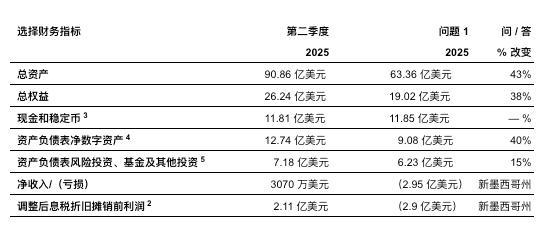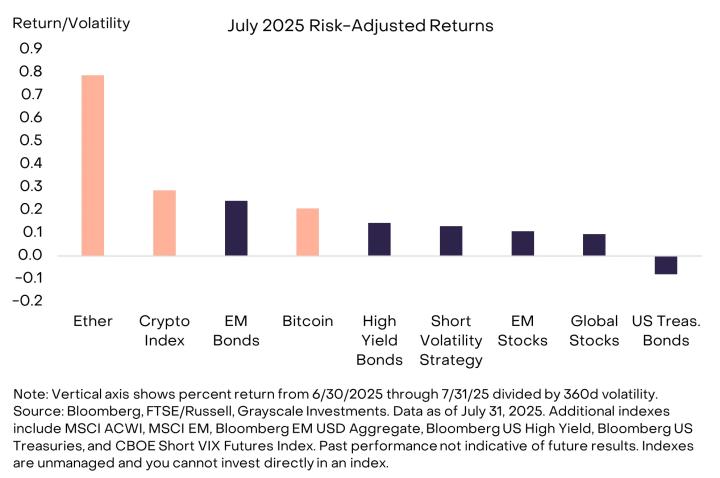
Text | Lin Wanwan
Editor | Jack
In the crypto world, the loudest is not the noisy transactions, but those who can quietly pocket $9 billion through connections.
In July 2025, 80,000 BTC from an address dormant for 14 years suddenly moved, which is one of the largest nominal BTC transactions in history. Such a scale of transfer should have triggered a 30% market drop, but the reality is - no significant crash, no panic, and these BTCs were quietly absorbed by the market.
A $9 billion chip was "silently" consumed by the market. The operator was neither an exchange nor a hedge fund, but a somewhat obscure Wall Street player: Galaxy Digital.
At the Q2 earnings call on the evening of August 5th, someone asked the CEO: How did you acquire the 80,000 BTC customer? Was there a formal bidding process?
The CEO casually replied: "For this deal, relationships matter more than quotations."
Moreover, BNB's treasury company, personally led by Chinese billionaire CZ, quietly hired David Namdar, the former co-founder of Galaxy Digital, as CEO.
Who exactly is behind Galaxy Digital? What kind of political and business resources were used to secure these epic transactions? And what new power structure is this network weaving for the crypto world?
High-Level "Friend Circle": Political Capital in the Board
The key to this transaction is not in the front-end quotation, but in the backstage connections - everything points to an old Wall Street veteran.
The 56-year-old founder, Mike Novogratz, is a standard "Wall Street product".
He worked at Goldman Sachs for 11 years, starting from the Southeast Asian futures desk and eventually becoming a fixed income partner. At that time, Novogratz was one of the few who could navigate between macro trading, asset portfolios, and national policies.
He then joined Fortress Investment Group, leading macro strategy investments, and was a key figure in the group's early bets on emerging markets and sovereign debt. During that period, he frequently visited policy institutions, central banks, and markets in Latin America, Asia, and Eastern Europe, negotiating bond issuance and exchange rate policies with local governments, familiar with the leverage and sovereignty game in "gray areas".
Between 2012 and 2015, he was a member of the New York Fed's Investment Advisory Committee, directly participating in policy consulting, monetary mechanism research, and financial institution assessment. This gave him the rare "dual capability" - understanding derivatives trading and the language and rhythm of regulatory bodies.
He was someone who had been dealing at the intersection of political power, Wall Street capital, and information for over a decade.
As early as 2013, he heavily invested his own funds in BTC and ETH, with a total investment of about $7 million. By 2017, he publicly stated in a CNBC interview: "In the past two years, I've earned over $250 million from crypto assets."
But he was neither a crypto "native" nor a typical speculator. His real turning point was in 2015 - that year, he suffered losses in the Brazilian interest rate market and left Fortress, briefly retiring from front-line investment. It was during this "gap period" that he first seriously examined BTC, rebuilding his understanding of money, credit, and financial infrastructure.
However, Novogratz did not stop at "holding BTC" like many early crypto evangelists. His ambition was to establish a new "financial system design" for the on-chain world. He said: "What I see is a systemic blank - crypto world's liquidity is getting deeper, but lacks structure."
In his view, almost the entire chain of asset management, market makers, clearing, ETF custody, PIPE financing, audit disclosure, and regulatory lobbying in the traditional financial world has no counterpart in the crypto world. This is a "institutional wasteland" in urgent need of reconstruction.
Galaxy Digital was born in this structural crack.
In 2018, Novogratz invested $350 million of his own money, successfully going public by reverse merging with a Canadian shell company, Bradmer Pharmaceuticals, becoming the first crypto financial platform offering full-stack services to institutions. It was a company designed as a "Wall Street version of an on-chain investment bank".
However, from the Canadian exchange to Nasdaq, Galaxy Digital's journey took 1,320 days, nearly four years. During this period, the company went through nine rounds of SEC feedback, countless legal reviews, and invested over $25 million to meet compliance requirements. In a regulatory winter where the entire crypto industry was blocked and frequently "going overseas", Galaxy persevered.

It is not a trading platform or a VC, but a "financial structure service provider" in the crypto field. Galaxy Digital was designed as a "Wall Street version of on-chain Goldman Sachs". Its structural design bears his Wall Street background everywhere:
Service list benchmarked against Goldman Sachs: covering asset management, market making, OTC trading, proprietary research and investment, risk management, financial advisory; trading structure benchmarked against Citadel: supporting dark pool matching, low-latency derivatives system, ETF liquidity interface; policy path benchmarked against Brookings: establishing a policy research team, writing reports, participating in hearings, entering regulatory sandboxes; compliance path benchmarked against Deloitte and EY: creating a "digital asset legal packaging system" supporting financial report entry and audit disclosure.
At the core of all this is the "political and business friend circle" built by Galaxy's board.
Among Galaxy Digital's board members is Tyler Williams, former U.S. Treasury Deputy Assistant Secretary, borrowed by the current Treasury Secretary as a special advisor for digital assets in 2025 - he can translate crypto language into regulatory language, serving as a crucial bridge for Galaxy's communication with SEC, CFTC, FASB, and other institutions.
There's also board member Doug Deason, one of the most influential land and energy lobbyists in Texas. He has been involved in pushing multiple legislation related to mining, electricity prices, and taxes, and is a key figure behind Galaxy's successful conversion of BTC mining farms into AI computing centers.
This "policy-capital-technology" three-line convergence structure gives Galaxy an extremely rare "policy influence capability" in crypto companies.
In the new financial structure he constructed, Galaxy is not just doing transactions and asset management, but is a "legal power connection" service provider for traditional companies entering the on-chain world.
Compared to CZ's extreme operational capability and SBF's aggressive capital strategy, Mike Novogratz is a different type of founder. He never emphasizes "decentralization" but focuses on "structural arrangements"; he also never uses token price as the sole indicator, but is more concerned with whether privacy, regulation, system, finance, custody, and compliance paths are truly connected.
This explains why, although Galaxy is not the strongest in traffic, it was the only player capable of securing the large order, completing clearing, and putting the counterparty at ease in that 80,000 BTC transaction that went unnoticed.
Many believe Galaxy Digital's moat is capital, but its real advantage is its political and business sensibility.
The Banker Behind Crypto Treasury
The 80,000 BTC is just a corner of this network. Companies represented by Chinese billionaire CZ have also begun to view Galaxy Digital as a "political passport" to compliance.
In mid-2025, a new mainstream narrative in U.S. stocks quietly emerged: crypto stocks. U.S. stocks are staging a capital "shell swap" - putting BTC and ETH into listed companies, allowing crypto assets to enter Wall Street under the guise of financial reports.
But before the end of 2023, this was considered a "forbidden zone" in the capital market.
U.S. companies find it very difficult to "legally hold coins" because the financial system cannot accommodate them. According to the FASB accounting standards at the time, crypto assets like BTC could only be recorded as "intangible assets" - depreciation when prices drop, but unable to count gains when prices rise, leading to severely distorted company financial reports and difficult audits.
For example, if you bought 10,000 ETH, you would immediately record the loss if it drops, but if it rises, you pretend not to see it and cannot count it as profit. This makes corporate financial reports look bad and audits a mess. The new FASB rules will start valuing at "fair value" from the 2025 fiscal year, where cryptocurrency gains are counted as income, truly opening the path to "holding cryptocurrency compliantly".
Galaxy was the earliest to enter and bring a group of listed companies "legally on board" as a service provider.
The earliest to smell the opportunity were a group of ancient ETH whales. They quietly packaged their ETH into US stock shell companies, using a left-hand-to-right-hand method to cash out discreetly under the market's radar by leveraging US stock liquidity. SharpLink Gaming was the leader in this "cashing out technique".
Soon, Chinese richest man CZ also followed - stuffing his platform's token BNB into a US stock company, borrowing a shell, packaging, listing, turning the platform token into a compliant asset and entering the capital valuation system.
Behind this series of operations, Galaxy Digital had quietly surfaced - it was the strategic consultant for the entire script.
It customized a "crypto treasury" narrative plan for these companies: from OTC positioning, asset custody, to compliant disclosure and pledge income, every step cannot bypass its built political-commercial channel, every step precisely treading the gray area between regulatory blind spots and capital leverage.
For complete content, please read the official account 【动察 Beating】
Click to learn about BlockBeats job openings
Welcome to join BlockBeats official community:
Telegram subscription group: https://t.me/theblockbeats
Telegram communication group: https://t.me/BlockBeats_App
Official Twitter account: https://twitter.com/BlockBeatsAsia







